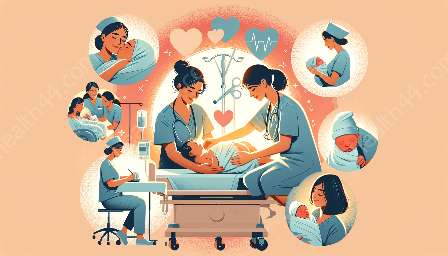Postpartum care and education are crucial aspects of maternal and newborn nursing, as well as general nursing practices. This comprehensive guide covers the key topics related to postpartum care and education, ensuring that mothers and newborns receive the support and guidance they need during the postpartum period.
Understanding Postpartum Care
Postpartum care refers to the medical and emotional support provided to a mother and her newborn following childbirth. This phase typically lasts six weeks, during which the mother's body undergoes various physical and emotional changes. Proper postpartum care is essential to ensure the well-being of both the mother and the newborn.
Physical Changes
Following childbirth, mothers experience physical changes such as uterine contractions, vaginal discharge (lochia), breast engorgement, and perineal soreness. Understanding these changes is crucial for effective postpartum care, as it allows healthcare providers to address any issues and provide appropriate guidance to the mother.
Emotional Health
Postpartum care also involves addressing the mother's emotional well-being. Many mothers experience a range of emotions, including mood swings, anxiety, and postpartum depression. Healthcare providers play a vital role in offering support, guidance, and resources to help mothers navigate the emotional challenges of the postpartum period.
Importance of Postpartum Education
Postpartum education is equally important, as it empowers mothers with the knowledge and skills necessary to care for themselves and their newborns. Education helps mothers understand what to expect during the postpartum period and how to address various challenges that may arise.
Self-Care
Education on postpartum self-care includes guidance on proper nutrition, adequate rest, and managing postpartum pain. Mothers are also educated on the importance of seeking help when needed and staying connected with healthcare providers to ensure their well-being.
Newborn Care
In addition to self-care, postpartum education covers essential newborn care, such as breastfeeding support, infant hygiene, and recognizing signs of newborn discomfort. This education empowers mothers to confidently and effectively care for their newborns during the postpartum period.
Aligning with Maternal and Newborn Nursing
Postpartum care and education are integral components of maternal and newborn nursing. Nurses specializing in this field are responsible for providing comprehensive care and education to mothers and newborns, promoting optimal health and well-being during the postpartum period.
Nursing Assessment
Nurses conduct thorough assessments of postpartum mothers and their newborns, ensuring that any physical or emotional concerns are identified and addressed promptly. This includes monitoring vital signs, assessing lochia and wound healing, evaluating breastfeeding success, and screening for postpartum depression.
Support and Guidance
In addition to assessments, nurses offer invaluable support and guidance to mothers, answering questions, providing reassurance, and advocating for their needs. Nurses also play a key role in educating mothers on self-care, newborn care, and the importance of seeking help when necessary.
General Nursing Considerations
While postpartum care and education are closely tied to maternal and newborn nursing, the principles and practices can also be applied to general nursing care. Understanding the unique needs of postpartum mothers and the challenges they may face enriches the overall nursing practice, promoting a more holistic approach to patient care.
Continuity of Care
Nurses in various specialties can benefit from understanding the fundamentals of postpartum care and education, as it enhances their ability to provide holistic care to women across different stages of life. This includes recognizing the impact of childbirth on a woman's physical and emotional health, thereby promoting continuity of care beyond the postpartum period.
Empathy and Support
General nursing practices can incorporate the empathy and support demonstrated in postpartum care, acknowledging that patients in different healthcare scenarios may also experience physical, emotional, and psychological challenges. By emphasizing empathy and providing comprehensive education, nurses can elevate the standard of care across various nursing specialties.
Conclusion
Postpartum care and education are essential components of nursing practice, particularly in the realm of maternal and newborn nursing. By prioritizing the physical and emotional well-being of postpartum mothers and their newborns, healthcare providers and nurses contribute to healthier outcomes and empower individuals to navigate the postpartum period with confidence and resilience.


